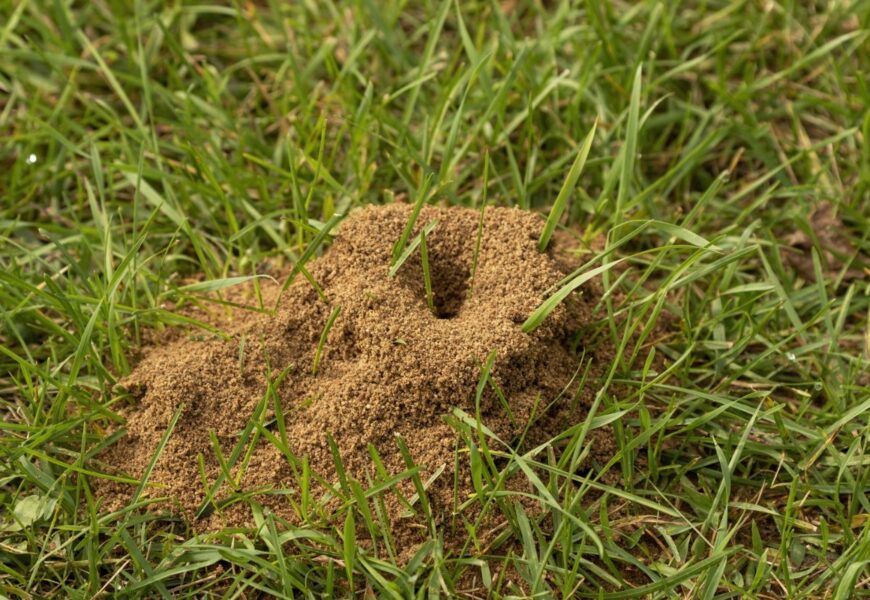Introduction
Dealing with ants in your garden can be frustrating, especially when anthills start to spread and damage your plants. Learning how to remove ant hill naturally allows you to protect your garden without harmful chemicals. In this guide, we’ll explore effective, eco-friendly methods to eliminate anthills, prevent future infestations, and maintain a healthy, thriving garden. Read on to discover practical tips that every gardener can use.
Understanding Ants and Their Behavior
Ants are common garden insects, with species varying in size, color, and behavior. While some ants help aerate the soil and control other pests, others can damage plants by farming aphids or disturbing roots. Understanding their habits, diet, and colony structure is essential before attempting removal. Knowing whether the ants are harmful allows you to choose the safest and most effective natural control methods.
Natural Prevention Methods
Preventing ant hills starts with good garden hygiene and regular soil maintenance. Removing fallen fruits, plant debris, and other food sources makes your garden less attractive to ants. Planting strongly scented herbs like mint, rosemary, or lavender can naturally repel them. Additionally, applying safe, natural repellents or powders around vulnerable areas helps reduce the chance of ants establishing new colonies.
Direct Natural Treatments for Anthills
Dealing with anthills directly can be done effectively using natural methods that are safe for your garden. If you’re wondering how to remove ant hill effectively, sprinkling diatomaceous earth around the mound dehydrates and deters ants without chemicals. Pouring boiling water or soapy water into the anthill can quickly collapse the colony. For persistent infestations, using borax or boric acid baits attracts ants and gradually eliminates the colony from within.
Confusing and Repelling Ants With Scents
Ants rely heavily on their sense of smell to navigate, making scents an effective natural deterrent. Strong fragrances like peppermint, tea tree oil, lemon eucalyptus, and cinnamon can confuse their trails and discourage them from settling. Spraying or sprinkling these oils around anthills or garden borders creates an invisible barrier. Regular application helps maintain a pest-free area while keeping your garden eco-friendly and safe for plants.
Household Items That Help Remove Ants
Everyday household items can be surprisingly effective in controlling ants naturally. Ingredients like white vinegar, cornstarch, coffee grounds, and liquid dish soap can disrupt ant trails and deter them from returning. These solutions are non-toxic and safe to use around children, pets, and plants. Incorporating them into your garden care routine provides a simple, eco-friendly way to manage ants without harsh chemicals.
Quick Methods to Get Rid of Ants Outdoors
Sometimes, immediate action is needed to tackle outdoor ant infestations. Physical methods like flattening or excavating anthills can disrupt colonies and reduce ant activity quickly. Combining these approaches with natural deterrents like soapy water or diatomaceous earth increases their effectiveness. Acting promptly prevents ants from spreading to other areas of your garden, keeping plants and soil healthy.
Getting Rid of Ants Indoors
Ants can easily find their way indoors in search of food and water, creating unwanted infestations. Keeping kitchen surfaces clean, storing food in sealed containers, and removing crumbs helps cut off their food sources. Natural repellents like vinegar, lemon juice, or essential oils can be applied along entry points to discourage ants. Regular monitoring and quick action ensure that indoor spaces remain ant-free without using harmful chemicals.
Step-by-Step Guide to Treating an Anthill Naturally
Treating an anthill naturally involves a combination of observation, prevention, and direct action. Start by identifying the anthill location and assessing the severity of the infestation. Apply safe methods such as sprinkling diatomaceous earth, pouring soapy or boiling water, or using natural baits. Following these steps carefully ensures effective removal while protecting plants and beneficial insects in your garden.
Maintaining a Pest-Free Garden
Keeping your garden free of ants requires consistent care and vigilance. Regularly cleaning up debris, fallen fruits, and plant waste reduces food sources that attract ants. Maintaining healthy soil and pruning plants prevents hiding spots for colonies. By combining preventive measures with natural treatments, you can enjoy a thriving, ant-free garden all year round.
How to Handle Other Common Garden Pests
Gardens often face multiple pests, and managing ants alongside others ensures overall plant health. Learning how to remove ant hill effectively helps prevent ants from spreading and damaging your garden. Aphids, woodlice, and slugs can harm leaves, roots, and flowers if left unchecked. Using natural remedies like neem oil, garlic sprays, or companion planting helps control these pests safely while supporting a balanced ecosystem.
Safety Considerations When Removing Anthills
Even natural ant control methods require caution when learning how to remove ant hill to protect yourself, pets, and plants. Boiling water or strong solutions can harm surrounding vegetation if applied carelessly. Always wear gloves when handling powders or baits and avoid direct contact with skin or eyes. Following safety precautions ensures effective anthill removal without causing unintended damage in your garden.
Choosing the Right Method for Your Garden
Selecting the most suitable ant removal method depends on your garden’s size, plant types, and infestation severity. Natural powders, baits, or physical disruption work best when matched to the specific situation. Consider the safety of children, pets, and beneficial insects when making your choice. Using the right approach ensures effective ant control while maintaining a healthy, thriving garden environment.
Environmental Benefits of Natural Treatments
Using natural methods to control ants protects the environment and supports a sustainable garden. Unlike chemical pesticides, these remedies do not contaminate soil, water, or air. They also preserve beneficial insects that help with pollination and pest control. Choosing eco-friendly solutions ensures a healthier garden ecosystem and contributes to long-term environmental well-being.
Summary of Top 5 Natural Ways to Remove Anthills
If you’re wondering how to remove ant hill naturally in your garden, here are five highly effective methods:
- Diatomaceous Earth: Sprinkle around the anthill to dehydrate ants and create a protective barrier.
- Soapy Water: Pour a mixture of water and liquid soap directly into the anthill to collapse the colony.
- Boiling Water: Carefully pour boiling water over the mound to destroy the nest quickly.
- Borax or Boric Acid Baits: Place small amounts mixed with sugar near the anthill to attract ants and eliminate the colony from within.
- Physical Disruption: Flattening or digging up the anthill can directly disturb the colony and reduce ant activity.
Additional Natural Remedies
Beyond the most common treatments, several other natural remedies can help repel or eliminate ants. Essential oils like neem, lemon, or cinnamon, as well as coffee grounds and citrus peels, can deter ants from settling. Regularly applying these substances around anthills and garden borders enhances overall ant control. These additional methods provide flexible, eco-friendly options for maintaining an ant-free garden.
Troubleshooting Common Issues
Even with natural treatments, ants may return or infest multiple areas in the garden. Identifying hidden colonies and sealing entry points is key to long-term control. Reapplying repellents, baits, or physical methods as needed helps maintain effectiveness. Staying vigilant and adjusting strategies ensures that your garden remains largely ant-free throughout the season.
Final Advice for a Healthy, Ant-Free Garden
A thriving, ant-free garden relies on a combination of prevention, natural treatments, and ongoing maintenance. Regular monitoring and prompt action at the first signs of ants prevent large infestations. Encouraging beneficial insects and maintaining healthy soil supports a balanced ecosystem. By following these practices consistently, you can enjoy a beautiful, productive garden without relying on harmful chemicals.
Also, read: Ficus Bonsai Plant: How to Care and Maintain It
Conclusion
Effectively managing ants in your garden doesn’t require harsh chemicals or complicated treatments. By following natural methods and preventive measures, you can protect your plants and maintain a healthy ecosystem. Learning how to remove an ant hill safely ensures long-term control while keeping your garden thriving. With consistent care and the right strategies, ants can be managed without harming your outdoor space.









